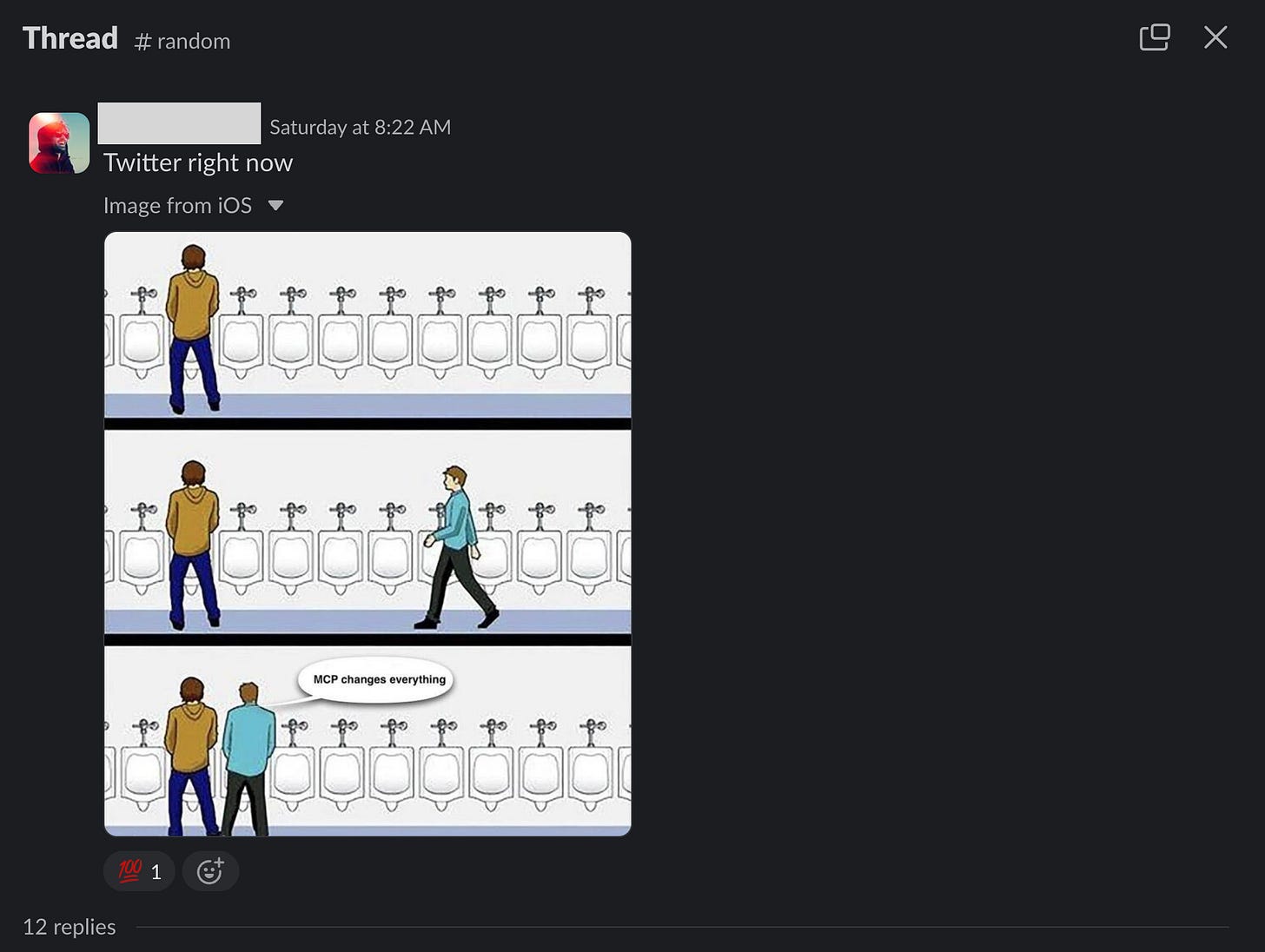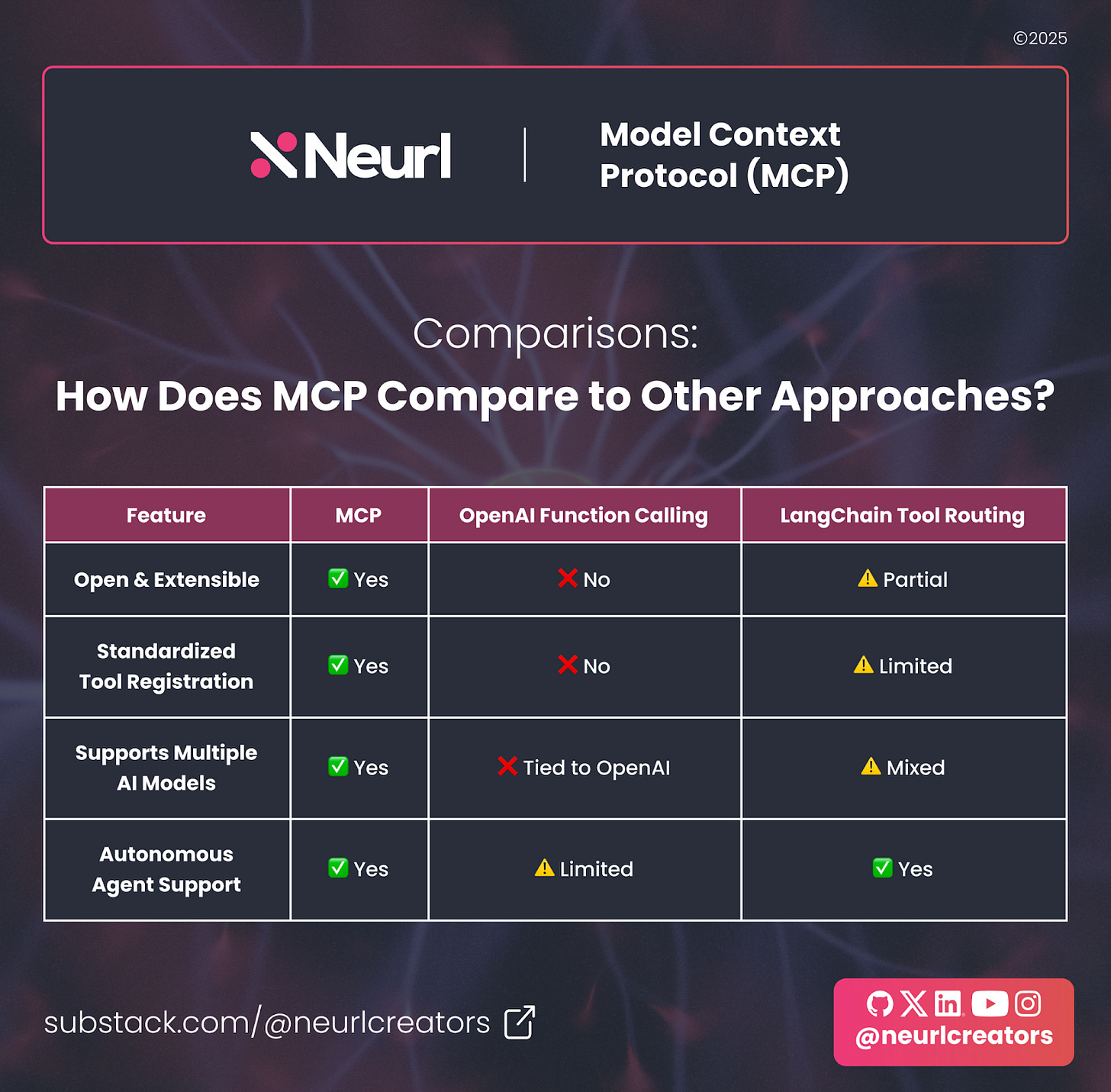Model Context Protocol (MCP): The Open-Source AI Context Standard for AI Agents & RAG Pipelines
BuildAIers Toolkit #3: AI context handling is broken—Model Context Protocol (MCP) fixes it. It’s the standard for AI context management you didn’t know you needed. 🚀
This review originally appeared in the MLOps Community Newsletter as part of our weekly column contributions for the community (published every Tuesday and Thursday).
Want more deep dives into MLOps tools and trends? Subscribe to the MLOps Community Newsletter (20,000+ builders)—delivered straight to your inbox every Tuesday and Thursday! 🚀
Welcome back to Tuesday Tool, where we help you navigate the ever-growing ML and AIOps stack.
This week, we’re exploring the Model Context Protocol (MCP), a framework loudly making waves in AI and MLOps circles.
MCP is Anthropic’s open protocol to standardize AI model interactions with external tools, databases, and memory systems.
MCP can give a structured, scalable solution if you’ve ever struggled with prompt engineering limitations, persistent context issues, or integrating models across multiple environments.
📢 What is MCP?
MCP is a protocol-layer abstraction that enables AI models—whether local or cloud-based—to retrieve, store, and process contextual information across multiple interactions. Think of it as "ODBC for AI", allowing models to tap into various structured and unstructured data sources without needing custom integrations.
It's a bridge between LLMs, databases, vector stores, user memory,and external APIs so that models keep context over time.
With MCP, we can move away from custom integrations and instead use a unified protocol to dynamically connect the models to different contexts.
This is super useful for long-running agent workflows, chat memory systems, and multi-turn interactions.
For instance, an LLM integrated with MCP can:
✅ Retrieve financial data from an API without requiring hardcoded queries.
✅ Maintain a user’s conversation history and context across different sessions.
✅ Dynamically generate SQL queries based on a schema retrieved in real-time.
Here's a basic example of how an AI assistant might use MCP to access historical memory and external tools:
from mcp_client import MCP
mcp = MCP(server_url="https://mcp.example.com")
# Store context (persistent memory)
mcp.store("user_profile", {"name": "Alice", "preferences": ["tech", "AI"]})
# Retrieve stored context
profile = mcp.retrieve("user_profile")
print(profile) # {'name': 'Alice', 'preferences': ['tech', 'AI']}
# Call an external API via MCP
response = mcp.call_tool("weather_api", params={"location": "San Francisco"})
print(response) # {"temp": "68°F", "condition": "Sunny"}🔥 Key Takeaway: This protocol eliminates reliance on prompt-based memory hacks, offering true contextual awareness for AI agents.
👉 GitHub Repo: MCP Official Repository
⚙️ How Does MCP Work?
MCP defines a standard protocol for AI tools and context memory to interact with various data sources and services. It achieves this by:
Defining "tools" as structured API endpoints that AI models can call based on context.
Creating "contexts" that enable memory-like persistence for long-running AI interactions.
Standardizing metadata exchange between AI systems and the external services.
This means:
AI applications don’t need to be rewritten to support new tools.
You can register new tools once and make them available to all models.
AI agents can autonomously retrieve data instead of relying on preloaded context.
🔥 What Would You Benefit?
MCP is a hot topic in the AI community. Some believe it's one of the biggest innovations in AI tool integration, while others think it's just a new version of existing API connectors. But there for sure are benefits:
📡 Universal Data Access: No more hardcoded integrations—MCP provides a standardized way to connect models with RAG systems, vector databases, and memory servers.
⚡ Enhanced Model Efficiency: By offloading context storage, models can focus on reasoning instead of token repetition.
🔁 Persistent Context Across Sessions: Unlike traditional session-based prompts, MCP allows AI agents to recall information beyond a single interaction.
🔌 Tool and Plugin Standardization: Easily connect models to external APIs, retrieval pipelines, and custom business logic.
✅ Modular & Open-Source: You can extend MCP to fit your own needs, from local LLM deployments to enterprise-scale applications.
📉 Some Limitations and Challenges To Consider
Despite the hype, MCP has its doubters. Some Redditors are skeptical that it's as groundbreaking as it claims to be:
❌ "It’s just a fancy tool API wrapper" – Seen some Reddit critics argue MCP is similar to OpenAI’s function calling, just with more structure.
❌ "Another layer of abstraction" – While it simplifies AI-tool interactions, it adds another dependency, which may not be necessary for smaller projects.
❌ "Early-stage, evolving rapidly" – The spec is still maturing, meaning breaking changes and limited compatibility outside Claude AI’s ecosystem (for now).
🔥 Community Take:
“Still not sure how I feel about MCP, its a bit of work, and it feels like a openapi spec is probably fine” – Patrick Barker (Conversation within the MLOps Community).
🔨 Setting Up MCP: How It Works
MCP is designed to work well with existing AI architectures. The key components include:
MCP Server: The backend system that handles context queries and maintains structured connections to external data.
MCP Clients: SDKs that allow AI applications to request and retrieve context dynamically.
MCP Tools: Integrations for databases, vector stores, APIs, and retrieval engines to enhance AI’s contextual understanding.
Need creative, high-quality technical content? Happy to chat! Book a call with our Creative Engineers👇🏾
👉 Example: Using MCP in Python
from mcp_client import MCPClient
mcp = MCPClient(server_url="http://localhost:5000")
# Querying for contextual data
response = mcp.query("Retrieve latest customer support tickets")
print(response)This simple snippet connects an AI system to external data using MCP’s universal interface, removing the need for complex API integrations.
👀 See MCP in Action:
💡 Real-World Use Case: Text-to-SQL AI assistant
A text-to-SQL AI assistant could use MCP to:
1️⃣ Query a database schema dynamically.
2️⃣ Generate structured SQL queries based on user input.
3️⃣ Retrieve, validate, and refine SQL results with AI-generated corrections.
Example MCP API Call:
{
"tool": "sales_db_query",
"parameters": {
"date_range": "last 30 days",
"product": "AI-powered software"
}
}This abstracts away API specifics, allowing AI applications to be more adaptable and maintainable.
We are seeing the text-to-SQL agent already being explored in the MLOps community, where MCP-powered AI agents can generate SQL queries without pre-defined schema access—a major improvement over static RAG methods.
📊 How Does MCP Compare to Other Approaches?
🧑⚖️ Final Verdict: Promising, But Still Early
⭐ Rating: ⭐⭐⭐⭐☆ (4/5)
MCP is one of the most promising AI infrastructure protocols we’ve seen. While still early-stage, its potential to standardize AI context management could make it a critical infrastructure piece for AI development—especially for multi-agent systems and complex AI workflows.
✅ You should consider using MCP if…
You’re building AI agents that need long-term memory and context awareness.
Your AI workflows rely on multiple external tools and databases.
You want a standardized way to manage external context across different AI models.
🚧 You might want to wait if…
You’re working on smaller, self-contained AI applications.
Your existing stack (e.g., LangChain, OpenAI Function Calling) already meets your needs.
You want to see broader adoption before investing in a new protocol.
Your use case involves static prompts, simple LLM completions, or high-speed applications where latency is critical.
🔗 Explore MCP on GitHub:
Rating Breakdown:
⭐ Ease of Use – ⭐⭐⭐
⚡ Performance Gains – ⭐⭐⭐⭐⭐
🔗 Integration Flexibility – ⭐⭐⭐⭐
📈 Long-Term Viability – ⭐⭐⭐⭐
🔥 Final Thought:
If LangChain and OpenAI Functions were the 1.0 version of tool integrations, MCP might be the 2.0 we’ve been waiting for.
The big question now? Will other AI ecosystems adopt it, or will this remain an Anthropic-specific play?
What do you think? 👇 Share your thoughts in the comments! 👇
📌 More Resources
Reddit Discussion: Why MCP is (or isn’t) a Big Deal
Official Anthropic Announcement: Read More




